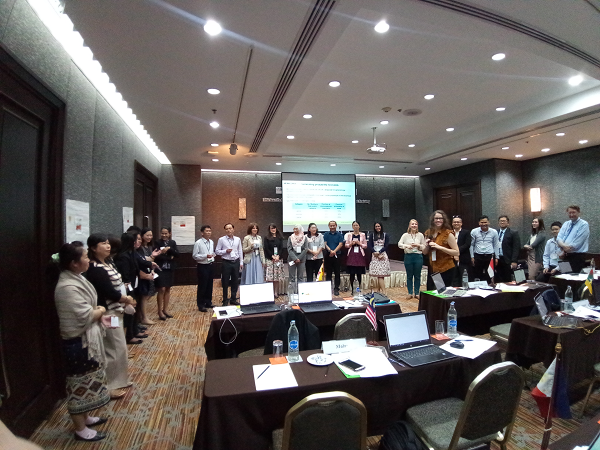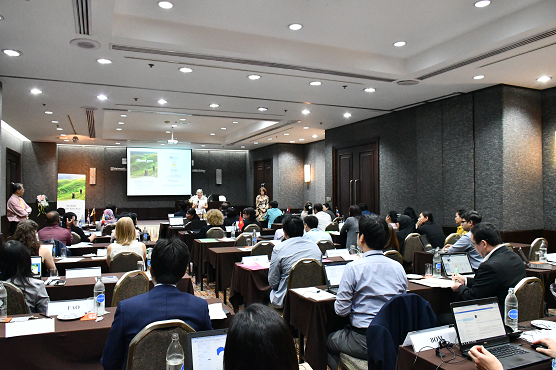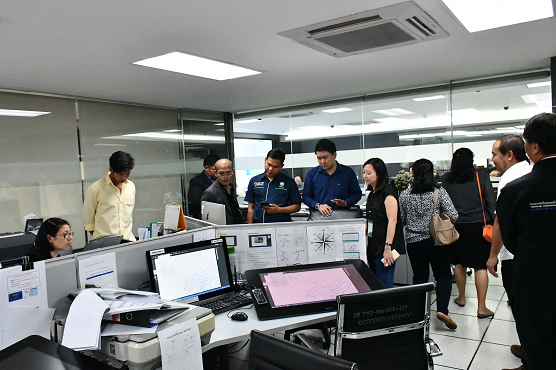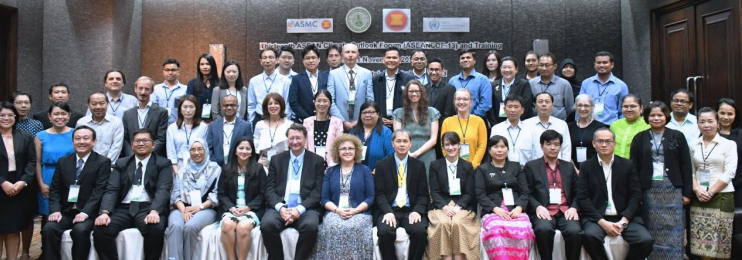02 JAN 2020
ASEANCOF
Review of the Thirteenth Session of the ASEAN Climate Outlook Forum (Bangkok, Thailand)

Workshop participants revising the concept of climatological terciles with a relatable application; working out what the near-normal height of particWMO DeRisk projectipants was and those who were in the below-normal category.
Introduction
The ASEAN Climate Outlook Forum (ASEANCOF) was established in 2013 and has since been held in various Southeast Asian countries with the hosts collaborating with ASMC. ASEANCOF aims to provide collaboratively developed and consensus-based seasonal climate outlooks and related information (e.g. climate drivers and monitoring) at the regional scale. The Regional Climate Outlook Forum concept (RCOF) was initiated by the World Meteorological Organization (WMO) Climate Information and Prediction Services (CLIPS) project, in collaboration with the National Meteorological and Hydrological Services (NMHSs), regional and international climate centres, among many other partners. The Thirteenth Session of the ASEAN Climate Outlook Forum (ASEANCOF-13) was held in 18 -21 November 2019, hosted by the Thai Meteorological Department. The forum consisted of two days of pre-COF training, followed by two days of the Climate Outlook Forum proper.
Pre-COF Training
The pre-COF training (18-19 November) aimed to provide a foundation-level understanding of seasonal prediction concepts, such as predictability sources (e.g. ENSO), forecasting methods (e.g. statistical versus dynamical modelling, and terciles constructing), and model verification techniques. The training was led by two trainers from the UK Met Office, Dr Tamara Janes and Dr Rosanna Amato, who promoted an interactive and hands-on approach to learning about seasonal forecasting.
Climate Outlook Forum Proper
The Climate Outlook Forum (COF) proper began on 20 November. The National Meteorological and Hydrological Services (NMHSs) participants who attended the pre-COF training were joined by representatives from the Global Producing Centres (GPC) that produce seasonal predictions: the Bureau of Meteorology, Australia, China Meteorological Administration, Japan Meteorological Agency, the International Research Institute for Climate and Society, and the WMO Lead Centre. Other participants included representatives from WMO, the ASEAN Economic Community Department, Regional Integrated Multi-hazard Early Warming Systems (RIMES), the Deutsche Gesellschaft fur Internationale Zusammenarbeit (GIZ GmbH), the Food and Agriculture Organization of the United Nations, and the DeRisk project. Both the GPC and NMHS representatives shared their regional or national level outlooks respectively for the upcoming December 2019-February 2020 season. The presentations paved the way for intensive discussion in the afternoon, before coming to a consensus on the seasonal climate outlook statement.
DeRisk Project
The morning’s programme on the last day of ASEANCOF-13 was led by representatives from the WMO DeRisk project. This project aims to develop climate risk management systems, best practices, and insurance products for the agricultural sector for select Southeast Asian countries. During the morning, participants were introduced to the DeRisk seasonal forecast online tool (including a hands-on demonstration), as well as listened to the presentations from the agricultural climate services sector in the various countries. Notably, even within the project, the group took different approaches for different countries to collect information on climate risks faced by the agricultural community, as well as different methods to disseminate information. However, all cases required interactions with users, as the presenters stressed that climate services are not possible without user involvement.
An introduction presentation to the DeRisk project, which aims to develop climate risk management systems, best practices, and insurance products for the agricultural sector in Southeast Asia.
A Visit to the Thai Meteorological Department
ASEANCOF-13 ended with a visit to the TMD headquarters, where ASEANCOF participants mingled with TMD staff. Participants learnt about how weather forecasts, seasonal outlooks, and climate projections were developed and communicated, as well as future areas of research conducted by the TMD.
Tour of the Thai Meteorological Department, covering various endeavours by the teams looking at the weather, seasonal, and climate timescales.
The ASEANCOF Consensus Statement for DJF 2019-2020 can be found here.